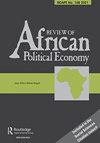Rethinking the ‘patron–client’ politics of oil block allocation, development and remittances in Nigeria
IF 1.4
3区 社会学
Q1 AREA STUDIES
引用次数: 5
Abstract
ABSTRACT This research adopts qualitative method and patron–client analysis to underscore the political economy of oil block allocation, development and receipts/remittances in Nigeria. It contests Wilson’s (1961) and Scott’s (1972) claims on the superiority of the patron over clients, and argues that ‘clients’ in Nigeria (indigenous oil block awardees) maintain some degree of control over the patron (ruling elite), enjoy more economic returns/oil rents, and possess some leverage over the patrons’ decision-making power. The ruling elite’s personalisation of oil block allocation/rents results in poor development of the upstream oil sector by ‘clients’, defaults in oil remittances and a consistent decline in oil production. The author recommends that the bidding process for oil block allocation be carried out in a more transparent and competitive manner.重新思考尼日利亚石油区块分配、发展和汇款的“主顾”政治
本研究采用定性方法和主顾分析来强调尼日利亚石油区块分配、开发和收入/汇款的政治经济学。它对Wilson(1961)和Scott(1972)关于赞助人优于客户的主张提出了质疑,并认为尼日利亚的“客户”(当地的石油区块获奖者)对赞助人(统治精英)保持着一定程度的控制,享有更多的经济回报/石油租金,并对赞助人的决策权拥有一定的影响力。统治精英对石油区块分配/租金的个性化导致了“客户”对上游石油部门的不良发展、石油汇款的违约和石油产量的持续下降。作者建议以更加透明和竞争的方式进行石油区块分配的招标过程。
本文章由计算机程序翻译,如有差异,请以英文原文为准。
求助全文
约1分钟内获得全文
求助全文
来源期刊

Review of African Political Economy
Multiple-
CiteScore
3.00
自引率
7.70%
发文量
29
期刊介绍:
The Review of African Political Economy (ROAPE) is a refereed journal committed to encouraging high quality research and fostering excellence in the understanding of African political economy. Published quarterly by Routledge, Taylor & Francis Group for the ROAPE international collective it has since 1974 provided radical analysis of trends and issues in Africa. It has paid particular attention to the political economy of inequality, exploitation and oppression, whether driven by global forces or local ones (such as class, race, community and gender), and to materialist interpretations of change in Africa. It has sustained a critical analysis of the nature of power and the state in Africa.
 求助内容:
求助内容: 应助结果提醒方式:
应助结果提醒方式:


